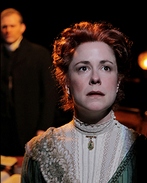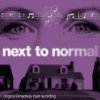SITE GUIDE
SEARCH
REVIEWS
REVIEW ARCHIVES
ADVERTISING AT CURTAINUP
FEATURES
NEWS
Etcetera and
Short Term Listings
LISTINGS
Broadway
Off-Broadway
NYC Restaurants
BOOKS and CDs
OTHER PLACES
Berkshires
London
California
New Jersey
DC
Connecticut
Philadelphia
Elsewhere
QUOTES
TKTS
PLAYWRIGHTS' ALBUMS
LETTERS TO EDITOR
FILM
LINKS
MISCELLANEOUS
Free Updates
Masthead
A CurtainUp Review
A Minister's Wife
By Elyse Sommer
|
We must learn how to live for each other We must learn how to love one another. From the first segment when dialogue segues into song by Morell, Prossy and Lexy. When he thought I might go away with you, Eugene He offered his strength, his strength in defense of me. The very thing he offered he receives from me. — Candida, in her musical explanation of the choice that concludes Shaw's marital triangle. |

Kate Fry
(Photo: Paul Kolnik) |
As for the source material — while George Bernard Shaw's Pygmalion seeded My Fair Lady, one of our most lyrical musical theater classic, Shaw's strong on social and political issue and rather talky plays aren't naturals for musicalization even with The Adding Machine's composer scoring actor-playwright-director Austin Pendleton's adaptation. Though lightning is unlikely to strike again in terms of making this musicalized marital drama flavored with Shaw's socialst passion a Broadway-ish hit, other elements in the announcements about the Lincoln Center production suggested that it could join the canon of small, somewhat special musical theater gems.
For starters, there's the casting of New York musical theater favorites Mark Kudisch and Bobby Steggert, neither of whom have ever disappointed me. With Kudisch and Steggert to duke it out over the title character's affections, we have strong acting and singing chops for the pompous but sincere Reverend Morell and the passionate 18-year-old poet Eugene Marchbanks. Another factor to encourage optimism is that Michael Halberstam, the man who conceived the idea of turning Shaw's play into a musical for the Chicago Writers Theatre, is on board as the director. He brings a thorough knowledge and understanding of the play to his concept. He has performed in it and also directed one of the best revivals of the play at the now defunct Cocteau Theater (our review).
All the above were part of my previously posted prequel. Now that I've seen the show, here, as promised, my report on whether my hopeful optimism about it's being a small gem, even if not a Broadway-ish hit, was warranted. In three little words: yes and no!
Even if Lerner and Lowe were still writing musicals, I don't think they could have made Candida sing about the "Rain in Spain" or joyfully relive her night on the town with "I Could Have Dance All Night." For sure, not in 95 minutes without an intermission and a single set.
A Minister's Wife is what it is, which is not really a musical but a chamber opera with both spoken and sung dialogue. The score is a combination of dissonance (which plants its feet in the new music category) and some lovely lyricism. At times the music even soars to hymnal intensity which suits this story about the comeuppance of a man whose devotion to his adored wife is matched by his passion for preaching socialism as well as Christian virtues as a Church of England minister.
Austin Pendleton's book is true to Shaw's play, perhaps too true to bring something fresh and new to a musical format as was the case with My Fair Lady. And while he's managed to wrestle the Shaw text to fit a one-act, 95-minute format, this conciseness makes this a bit too much like a play version of one of those once popular Reader's Digest Condensed Books.
The casting is an almost all yes. While Kudish seems a bit constrained in this role and not especially comfortable or consistent with his British accent, he does ultimately convey Reverend Morell's emotional journey. And he definitely has the voice to bring out the best in Schmidt's new opera style score. Bobby Steggert is a bit too aggressively petulant and hostile to Morell as the Candida-smitten young poet but, like Kudisch, he sings beautifully. Kate Fry, who's unknown to me, is a fine Candida, especially in the final and best scene. Liz Baltes (who like Fry, was in the previous Chicago production) and Drew Gehling round out the 5-member cast nicely as Morell's more than devoted secretary Prossy and his loyal Curate, Lexy.
Add to the mostly yes factor pertaining to the performers and the music, Allen Moyer's gorgeously detailed Victorian home office setting, David Zinn's apt costumes (though that sporty little black windbreaker and the flared pants for Kudisch are a bit odd) and the excellent work of the four musicians neatly tucked out of sight behind a scrim"wall." It all points to an okay for calling A Minister's Wife a little gem, except — and here I go quibbling again — unlike The Adding Machine or other small musicals I've loved, this is more a zircon than a pure diamond gem.
The most egregious loss resulting from Pendleton's tightly trimmed adaptation is Mr. Burgess, Candida's father and the first big male personality in her life. Being an ueber greedy capitalist Burgess adds a humorous counterpoint to the high minded Morell in the play. In Pendleton's book he's reduced to several mentions which eliminates that humor.
Since lyricist Jan Levy Tranen also adhered closely to Shaw's plot and dialogue, the script and lyrics for A Minister's Wife, instead of enhancing and enriching Shaw's text, seem to compete with it. Since Shaw continues to be frequently produced to this day because he is so incisive and witty this is a no win for Pendleton and Tranen that triggers the thought "was musicalizing a perfectly fine play really necessary?"
Tranen's lyrics do take clever and more independent turns occasionally, for example, the "Shy Shy Shy" segment. That's when Marchbanks gets into an argument with Prossy after she catches him diddlng with her with her typewriter. This leads to a debate about love letters and the need for love which he tells her they're both too shy to decare ("You and I, we long for love/but we cannot ask. . ./A songbird finds a way to sing a song of love/ A lappdog finds a lap in which to lay his head. /When love is spoken, love is returned. Love unspoken is love unearned"). Prossy indeed has only soliloquized her true feelings for her boss in a jealous refrain when he's all agog at welcoming his wife home for a brief visit ("Candida here, /and Candida there! /All this for a tol'rable figure/And crop of good hair!"). But young Marchbanks is anything but shy about declaring his love for Candida and turning the Reverend's household into an emotional battlefield.
Expert director that he is, Mr. Halberstam can't keep some stasis from creeping onto the beautifully furnished stage, mostly because the transitions from talk to song and back often come off as forced and awkward. The emotional conflicts and release of inner feelings do burst into full bloom in the final scene when the score and lyrics also reach a crescendo. But that perfect moment isn't quite sufficient to transform this zircon gem into a true blue diamond.
|
A Minister's Wife Based on a 1898 version of George Bernard Shaw's Candida Conceived and directed by Michael Halberstam Book by Austin Pendleton Music by Joshua Schmidt Lyrics by Jan Levy Tranen Cast: Liz Baltes (Proserpine Garnett), Kate Fry (Candida), Drew Gehling (the Rev. Alexander Mill), Marc Kudisch (the Rev. James Mavor Morell) and Bobby Steggert (Eugene Marchbanks) Sets: Allen Moyer Costumes: David Zinn Lighting: Keith Parham Sound: Scott Stauffer Orchestrations: Joshua Schmidt Musical direction: Richard Carsey Conductor: Timothy Splain Running Time: 95 minutes. Lincoln Center/ Mitzi E. Newhouse Theater 150 West 65 Street From 4/07/11; opening 5/08/11; closing 6/12/11 Tuesday through Saturday evenings at 8pm, with matinees Wednesday and Saturdays at 2pm and Sundays at 3pm. Ticvkets $75 and $85 Reviewed by Elyse Sommer May 12th |
|
REVIEW FEEDBACK Highlight one of the responses below and click "copy" or"CTRL+C"
Paste the highlighted text into the subject line (CTRL+ V): Feel free to add detailed comments in the body of the email. . .also the names and emails of any friends to whom you'd like us to forward a copy of this review. Visit Curtainup's Blog Annex For a feed to reviews and features as they are posted add http://curtainupnewlinks.blogspot.com to your reader Curtainup at Facebook . . . Curtainup at Twitter Subscribe to our FREE email updates: E-mail: esommer@curtainup.comesommer@curtainup.com put SUBSCRIBE CURTAINUP EMAIL UPDATE in the subject line and your full name and email address in the body of the message. If you can spare a minute, tell us how you came to CurtainUp and from what part of the country. |

Slings & Arrows-the complete set
You don't have to be a Shakespeare aficionado to love all 21 episodes of this hilarious and moving Canadian TV series about a fictional Shakespeare Company




